Kathleen Jones's Blog, page 55
May 6, 2013
Tuesday Poem: The Shape of the Wind
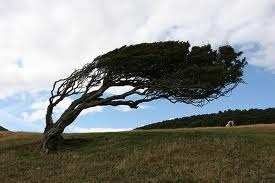 The Shape of the WindThe wind has no colour
The Shape of the WindThe wind has no colourbut the things it moves;
no shape but the gaps;
a tree fallen and the rib-cage
of a roof picked bare.
The wind has no voice
but the tuning prongs of chimneys
and wires, walls and masts
singing their frequencies - their
true notes and under-notes;
a howling orchestra of silent things,
the whole sky an up-turned bell
ringing and ringing in an ocean of air.
© Kathleen Jones 2013
The wind was one of the most memorable things about Moniack Mhor. It howled round the house, buffeting windows and doors. Outside you could hardly stand up against its invisible force. But there was something exhilarating about this wind - the sheer power of nature. It made my skin prick with goose-bumps and generated a feeling of excitement. I wanted to kick up my hooves like a frisky horse and run wild! This was one of the poems generated in our 'silent' writing sessions first thing in the morning. All I could hear or think about was the wind.
For more contributions from the Tuesday Poets, please go to the Tuesday Poem hub and check out the poets in the sidebar.
Published on May 06, 2013 10:14
May 3, 2013
Tracking Kathleen Raine and Norman Nicholson
This week, the task has been to do more research for my Norman Nicholson biography. Thursday was a beautiful, sunny, spring day and we went out to do some exploring around the various houses that have Nicholson connections. For a short period, at the beginning of World War II, Norman Nicholson and Kathleen Raine were very close. Kathleen had come north from London with her two children, after the break-up of her marriage, to find peace and quiet and creative space to concentrate on poetry. She rented an isolated house in the Cumbrian fells above Ullswater, near a hamlet called Martindale. The 'Old Vicarage' is a cottage - a long way from the nearest church - in the middle of a field, with the fells rising behind immediately behind it. There are no near neighbours and Martindale is quite a long walk. In the days when very few had cars, getting there by public transport would have been a challenge. People walked for miles because they had to. Kathleen Raine loved it and found the isolation perfect for writing poetry.
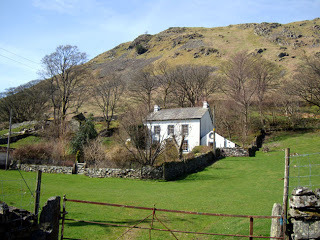 The Old Vicarage
The Old Vicarage
Norman visited her there on several occasions and wrote several poems at her house. Kathleen and Norman helped each other with their first collections and the title of Kathleen Raine's - Stone and Flower - is a quote taken from one of Norman's poems. Many of the poems in Norman's second collection - Rock Face - were either written for Kathleen, or came out of their conversations and collaborations.
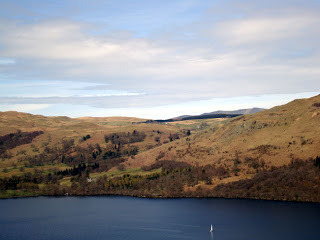 White dot near the woods on the skyline is Cockley MoorJust across the lake, though a long way round Ullswater by road, you can just see a house on the hillside near the skyline. This is Cockley Moor, which was owned by an elderly, wealthy patron of the arts called Helen Sutherland, who sponsored the painters Winifred Nicholson (no relation) and her ex-husband Ben, who had married Barbara Hepworth, as well as Norman and Kathleen. When Kathleen had to return to London to earn a living, Helen Sutherland looked after her children. Norman was sometimes a weekend guest at Helen's house parties, which included writers such as TS Eliot. Mixing in such aristocratic, wealthy, artistic circles was quite a challenge for a boy who had been born firmly working class in a terraced house in Millom. Cockley Moor is a long, higgledy-piggledy, grey building, converted in the thirties from a farmhouse, cottage, and farm buildings to house Helen Sutherland's guests and her art collection. Plus the chauffeur and the maid. The house was later owned by the astronomer Fred Hoyle.
White dot near the woods on the skyline is Cockley MoorJust across the lake, though a long way round Ullswater by road, you can just see a house on the hillside near the skyline. This is Cockley Moor, which was owned by an elderly, wealthy patron of the arts called Helen Sutherland, who sponsored the painters Winifred Nicholson (no relation) and her ex-husband Ben, who had married Barbara Hepworth, as well as Norman and Kathleen. When Kathleen had to return to London to earn a living, Helen Sutherland looked after her children. Norman was sometimes a weekend guest at Helen's house parties, which included writers such as TS Eliot. Mixing in such aristocratic, wealthy, artistic circles was quite a challenge for a boy who had been born firmly working class in a terraced house in Millom. Cockley Moor is a long, higgledy-piggledy, grey building, converted in the thirties from a farmhouse, cottage, and farm buildings to house Helen Sutherland's guests and her art collection. Plus the chauffeur and the maid. The house was later owned by the astronomer Fred Hoyle.
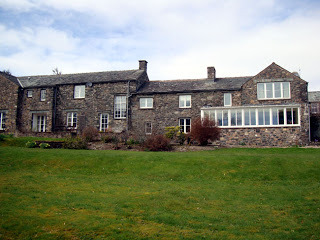 Cockley Moor
Cockley Moor
Cockley Moor is remote - high on the fellside up a dead end road that leads only to a farm, with few other houses in the vicinity. Far from big city light pollution, it must be an ideal place to view the stars on clear nights.
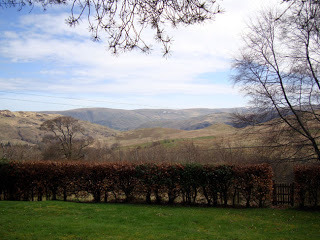 The view from the garden Wild, isolated and very beautiful, it's an odd place for a patron of the arts to live. But according to Winifred Nicholson, Helen Sutherland had cold baths every morning, walked 20 miles a day, and lived on grapes, apples and lettuce. Guests at her house parties had to live in a similarly spartan fashion and were penalised for being late for meals. Sounds like lots of fun!!
The view from the garden Wild, isolated and very beautiful, it's an odd place for a patron of the arts to live. But according to Winifred Nicholson, Helen Sutherland had cold baths every morning, walked 20 miles a day, and lived on grapes, apples and lettuce. Guests at her house parties had to live in a similarly spartan fashion and were penalised for being late for meals. Sounds like lots of fun!!
 The Old Vicarage
The Old VicarageNorman visited her there on several occasions and wrote several poems at her house. Kathleen and Norman helped each other with their first collections and the title of Kathleen Raine's - Stone and Flower - is a quote taken from one of Norman's poems. Many of the poems in Norman's second collection - Rock Face - were either written for Kathleen, or came out of their conversations and collaborations.
 White dot near the woods on the skyline is Cockley MoorJust across the lake, though a long way round Ullswater by road, you can just see a house on the hillside near the skyline. This is Cockley Moor, which was owned by an elderly, wealthy patron of the arts called Helen Sutherland, who sponsored the painters Winifred Nicholson (no relation) and her ex-husband Ben, who had married Barbara Hepworth, as well as Norman and Kathleen. When Kathleen had to return to London to earn a living, Helen Sutherland looked after her children. Norman was sometimes a weekend guest at Helen's house parties, which included writers such as TS Eliot. Mixing in such aristocratic, wealthy, artistic circles was quite a challenge for a boy who had been born firmly working class in a terraced house in Millom. Cockley Moor is a long, higgledy-piggledy, grey building, converted in the thirties from a farmhouse, cottage, and farm buildings to house Helen Sutherland's guests and her art collection. Plus the chauffeur and the maid. The house was later owned by the astronomer Fred Hoyle.
White dot near the woods on the skyline is Cockley MoorJust across the lake, though a long way round Ullswater by road, you can just see a house on the hillside near the skyline. This is Cockley Moor, which was owned by an elderly, wealthy patron of the arts called Helen Sutherland, who sponsored the painters Winifred Nicholson (no relation) and her ex-husband Ben, who had married Barbara Hepworth, as well as Norman and Kathleen. When Kathleen had to return to London to earn a living, Helen Sutherland looked after her children. Norman was sometimes a weekend guest at Helen's house parties, which included writers such as TS Eliot. Mixing in such aristocratic, wealthy, artistic circles was quite a challenge for a boy who had been born firmly working class in a terraced house in Millom. Cockley Moor is a long, higgledy-piggledy, grey building, converted in the thirties from a farmhouse, cottage, and farm buildings to house Helen Sutherland's guests and her art collection. Plus the chauffeur and the maid. The house was later owned by the astronomer Fred Hoyle. Cockley Moor
Cockley MoorCockley Moor is remote - high on the fellside up a dead end road that leads only to a farm, with few other houses in the vicinity. Far from big city light pollution, it must be an ideal place to view the stars on clear nights.
 The view from the garden Wild, isolated and very beautiful, it's an odd place for a patron of the arts to live. But according to Winifred Nicholson, Helen Sutherland had cold baths every morning, walked 20 miles a day, and lived on grapes, apples and lettuce. Guests at her house parties had to live in a similarly spartan fashion and were penalised for being late for meals. Sounds like lots of fun!!
The view from the garden Wild, isolated and very beautiful, it's an odd place for a patron of the arts to live. But according to Winifred Nicholson, Helen Sutherland had cold baths every morning, walked 20 miles a day, and lived on grapes, apples and lettuce. Guests at her house parties had to live in a similarly spartan fashion and were penalised for being late for meals. Sounds like lots of fun!!
Published on May 03, 2013 23:05
Spring has (finally) Sprung
It's been a long time coming, both in Italy and England, but finally there are signs of new life! These are the first little ducklings I've seen - swimming with Mum on the weir.
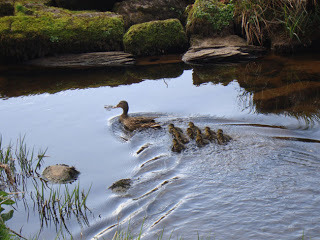

Published on May 03, 2013 10:40
April 30, 2013
Singing Over the Bones at Moniack - Pt 2
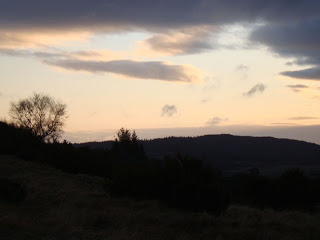 Dawn from the iron age fort Writing retreats are strange things - you’re taken from one world into another - a little bubble of solitude, but solitude within a group. There’s a feeling of life suspended, other worldly. A writing retreat is a threshold - you can step back into your own life afterwards, or you can cross the threshold and come out of it seeing the world differently.
Dawn from the iron age fort Writing retreats are strange things - you’re taken from one world into another - a little bubble of solitude, but solitude within a group. There’s a feeling of life suspended, other worldly. A writing retreat is a threshold - you can step back into your own life afterwards, or you can cross the threshold and come out of it seeing the world differently. 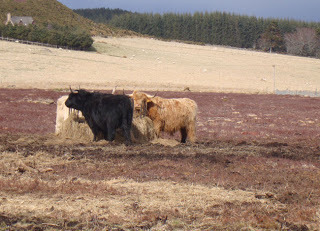 Highland Cattle
Highland CattleThere were some big questions to think about.
What exactly is a sense of belonging?
How do we re-learn living in a way that doesn’t harm the planet?
How do we deal with the sense of impotence and despair faced by pollution and despoilation on a global scale, that we as individuals feel powerless to change?
Is one person giving up plastic carrier bags in Tescos going to have any effect at all in a world where millions of tons of plastic is jettisoned every year in places like Asia where we have no influence?
Have old myths and stories anything to teach us about the way we relate to the landscape today?
And how do we deal with the disconnectedness that is increasingly felt by people living in Urban environments?
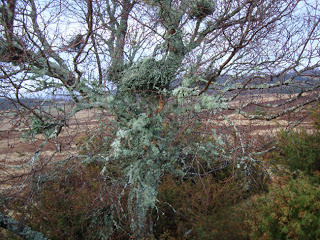 A birch tree decorated with lichenI was a little apprehensive when I arrived. I’m not a group person - I like people in ones, twos and possibly threes and I’m definitely no good at disembowelling myself emotionally in front of others. But this was a week of like-minded people, there for a common purpose - a generous and supportive group that included a farmer, an ecologist, a psychotherapist and someone running a tourist company - all of us poets and writers.
A birch tree decorated with lichenI was a little apprehensive when I arrived. I’m not a group person - I like people in ones, twos and possibly threes and I’m definitely no good at disembowelling myself emotionally in front of others. But this was a week of like-minded people, there for a common purpose - a generous and supportive group that included a farmer, an ecologist, a psychotherapist and someone running a tourist company - all of us poets and writers.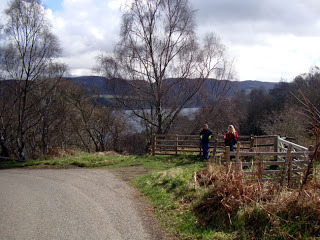 We walked to Loch Ness but didn't see the monster!We explored our own wild sides, which included sampling malt whisky, howling at the full moon (not necessarily in that order), watching the dawn from an iron age hill fort, walking in the rain, as well as more mundane things like early morning conversations over tea in the kitchen, cooking and washing-up together, and late night huddles round the wood burning stove.
We walked to Loch Ness but didn't see the monster!We explored our own wild sides, which included sampling malt whisky, howling at the full moon (not necessarily in that order), watching the dawn from an iron age hill fort, walking in the rain, as well as more mundane things like early morning conversations over tea in the kitchen, cooking and washing-up together, and late night huddles round the wood burning stove.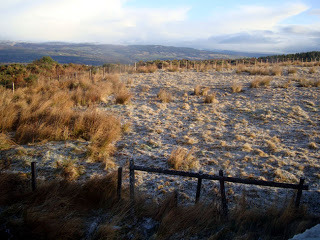 Waking up to snowWe had quiet writing sessions and workshops designed to stretch us, expertly run by Roselle Angwin and Sharon Blackie. Some of the work that came out of these sessions was mind-blowing!
Waking up to snowWe had quiet writing sessions and workshops designed to stretch us, expertly run by Roselle Angwin and Sharon Blackie. Some of the work that came out of these sessions was mind-blowing!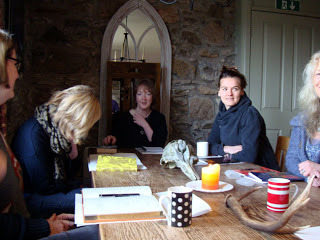 Sharon under the mirror, Roselle unfairly at the edge of the photo. Apologies!And, yes, some of us did miss our men-folk. But it would have been different if men had been around. We wouldn’t have talked so openly, or bonded so tightly. There’s something about same-sex groups that permits free thought and discussion - there’s no inter-gender dynamic to distract or censor. Ironically, one of the things we looked at was the negative effect of dualism and the necessity of working together if anything is to be achieved. We left vowing to Do Something - to Make a Difference, individually and together. Watch this space .....
Sharon under the mirror, Roselle unfairly at the edge of the photo. Apologies!And, yes, some of us did miss our men-folk. But it would have been different if men had been around. We wouldn’t have talked so openly, or bonded so tightly. There’s something about same-sex groups that permits free thought and discussion - there’s no inter-gender dynamic to distract or censor. Ironically, one of the things we looked at was the negative effect of dualism and the necessity of working together if anything is to be achieved. We left vowing to Do Something - to Make a Difference, individually and together. Watch this space .....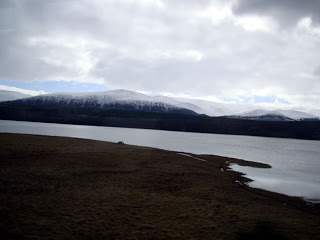
If you would like to read one of the things that came out of the course, Finchley Road, by Vivienne Palmer, please click on the link.
Published on April 30, 2013 02:32
April 28, 2013
Moniack Mhor - a week in retreat - Pt 1
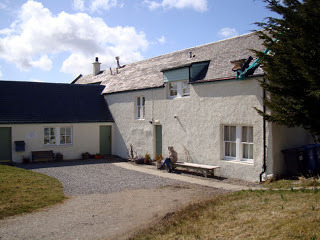
I've just come back from Moniack Mhor, north of Inverness, where I've been 'Singing Over the Bones - Women Writing from the Wild'. A week of silence, no computers, blogging or mobile phones and a lot of landscape!
This was my room - like a monastic cell, but with central heating -
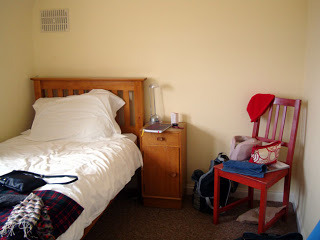
my writing table
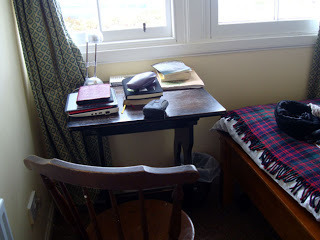
with views of this -
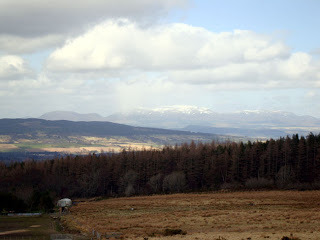
The object of the week was to explore our relationship with our own wild selves as well as the landscape. We spent as much time as we could out in it, despite a scouring wind that howled round the house for 3 days and nights, and brought rain and snow. It's amazing what you see when you go out and really look. I spent some of my time in the woods - forestry plantations, not remnants of the original Caledonian Forest, and sadly lacking in the kind of bio-diversity that old forests possess. But with the kind of mysterious beauty that all woodlands have.
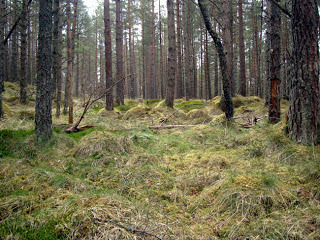
Despite the wind, the wood anemones were just beginning to open out in sheltered places
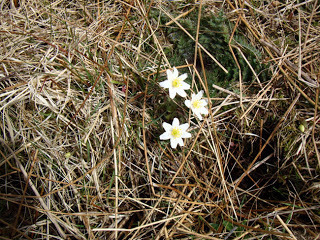
and there were trees like this
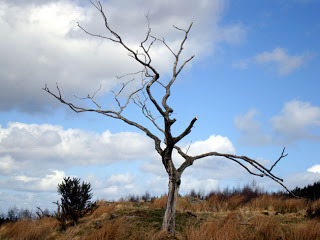
and rocks like landscapes in themselves.
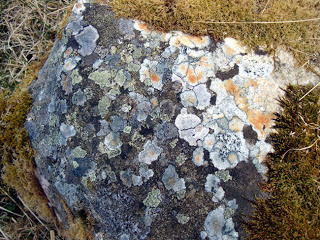
All of which we talked about and wrote about round the big table at Moniack (with biscuits!).
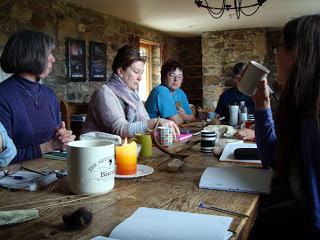
There were eleven of us and we were all very different - ages and backgrounds and disciplines, but all passionate about the environment. From the beginning it was going to be a very interesting week! Which way did it go?
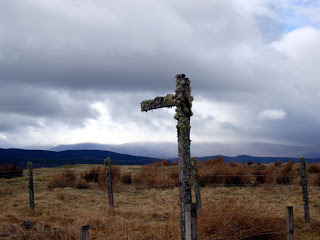
It was a week full of wonderful surprises, which I'll talk about in a couple of days.
'Singing Over the Bones - Women Writing the Wild' was being run by Sharon Blackie , writer, story-teller, editor of Earthlines and Two Ravens Press , and Roselle Angwin , poet, novelist and mentor.
Published on April 28, 2013 14:02
April 22, 2013
Tuesday Poem: Sharon Olds - Stag's Leap
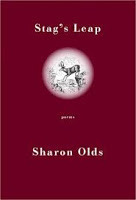 Then the drawing on the label of our favourite red wine
Then the drawing on the label of our favourite red winelooks like my husband, casting himself off a
cliff in his fervour to get free of me.
His fur is rough and cosy, his face
placid, tranced, ruminant,
the bough of each furculum reaches back
to his haunches, each tine of it grows straight up
and branches, like a model of his brain, archaic,
unwieldy. He bears its bony tray
level as he soars from the precipice edge,
dreamy. When anyone escapes, my heart
leaps up. Even when it’s I who am escaped from,
I am half on the side of the leaver. It’s so quiet,
and empty, when he’s left. I feel like a landscape,
a ground without a figure. . . .
. . . Oh my mate, I was vain of his
faithfulness, as if it was
a compliment, rather than a state
of partial sleep. And when I wrote about him, did he
feel he had to walk around
carrying my books on his head like a stack of
posture volumes, or the rack of horns
hung where a hunter washes the venison
down with the sauvignon? . . .
Sharon Olds won the TS Eliot Prize last year for her new collection, Stag’s Leap, and the judges were apparently unanimous, something that rarely happens with literary prizes. I’m always in two minds about Sharon Olds’ poetry - it’s musical and muscular and beautifully constructed, but a part of me feels . . . What do I feel? Slightly embarrassed, squeamish even, about the frankness of her revelations, particularly about other people. I would never be able to expose my family like that - but perhaps that just being British! In the beginning, such frankness was very original - a woman ‘writing the body’ in a way that had never been written before. But then it became a little boring - I sometimes wanted her to write about other things. So I approached Stag’s Leap with caution, and was bowled over by it.
Stag’s Leap is the label of a vineyard - the favourite wine of Sharon and her husband of thirty years. But it became the symbol of her husband’s leap for freedom when he left her for another woman - a medical colleague. In the sequence of poems that tells the story of the breakdown of her marriage and its aftermath, she freely admits the part her own revelatory poetry had played in it.
Her husband was a very quiet, private man, and she was the opposite, and she had never realised the impact her very frank and uninhibited poetry was having on him. In revealing the details of her own sex life, she had also revealed his.
One of her poems describes how her husband would stand up whenever there was a call for ‘a doctor in the house’, and she would be proud. But she realises now that ‘when words were called for, and I stood’ it was very different for him. Now when the call comes he and his new wife can stand up together - partners in everything.
During the break-up, Sharon Olds is astonished by the courtesy with which they treat each other, the habit of physical intimacy that still exists in those last days.
. . . ‘He shows no anger,
I show no anger but in flashes of humour,
all is courtesy and horror.’
She goes through all the phases of relationship grief - bewilderment, anger, self-blame, the pain of loss, numbness, to acceptance. Being able to see things from his point of view is an extra pain.
. . . ‘did his spirit turn against the spirit which
tolled our private, wild bell
from the public roof top, I who had no other
gift to give the world but to hold what I
thought was love’s mirror up to us.. .
. . . ‘but then one day
I woke, and feared he felt he was the human
sleeper, and I the glittering panther
holding him down, and screaming.’
Stag’s Leap tells the story from the moment of discovery when Sharon finds another woman’s photograph in her husband’s running shorts - a woman she knows. The night he tells Sharon that he is in love with the other woman and that he will ‘probably’ leave her. The story moves through the dividing of possessions, the construction of a life alone, the realisation that what she had taken for granted was a good relationship was quite the opposite for him. ‘I hadn’t known he could lie’.
The sequence is very moving, perhaps because of its absolute honesty and humility, but it also thrills in the way it uses language - this is a major poet in complete command of technique and language. The complex rhythms and linguistic twists in ‘Left-Wife Bop’, ‘Red Sea’ and ‘Left-Wife Goose’ leave you giddy. The ending is very powerful - in ‘Years Later’, they meet again, briefly.
. . . ‘And then there is the spring park,
damp as if freshly peeled, sweet
greenhouse, green cemetery with no
dead in it - except, in some shaded
woods, under some years of leaves and
rotted cones, the body of a warbler
like a whole note fallen from the sky - my old
love for him, like a songbird’s rib cage picked clean.’
Stag's Leap, by Sharon Olds, published by Cape Poetry.
This is Sharon reading at the TS Eliot Awards , introduced by Ian MacMillan
for more fantastic Tuesday Poems, please click the link to visit the Tuesday Poem hub and check out the posts in the sidebar.
Published on April 22, 2013 15:30
April 19, 2013
Off into the wilderness .....
I won't be blogging for the next week, or twittering and Facebook will have to get along without me. I'm off tomorrow to the wild reaches of northern Scotland, north of Inverness for a week of retreat at Moniack Mhor, the Arvon Foundation's most northerly outpost - a location of bleak beauty and extreme weather.
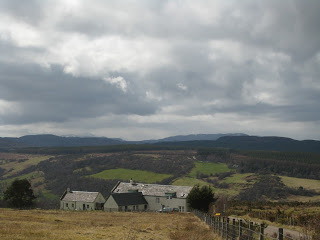 The retreat is being run by Dr Sharon Blackie, editor of Earthlines Magazine and
Two Ravens Press
and
Roselle Angwin
, and it's called
'Singing Over the Bones
- Women Writing from the Wild'. I don't really know what to expect from it. One part of me is very excited at the idea of being cut off from computers and telephones and other modern gadgetry for a week with nothing to do but write; the other is rather afraid that nothing will happen at all - that I'll arrive so exhausted I'll spend the week sleeping rather than thinking and writing. Will I find my own inner Wild Woman? And will I like the other wild women I'm sharing a house with?
The retreat is being run by Dr Sharon Blackie, editor of Earthlines Magazine and
Two Ravens Press
and
Roselle Angwin
, and it's called
'Singing Over the Bones
- Women Writing from the Wild'. I don't really know what to expect from it. One part of me is very excited at the idea of being cut off from computers and telephones and other modern gadgetry for a week with nothing to do but write; the other is rather afraid that nothing will happen at all - that I'll arrive so exhausted I'll spend the week sleeping rather than thinking and writing. Will I find my own inner Wild Woman? And will I like the other wild women I'm sharing a house with?
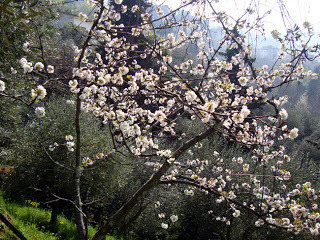
And how can I leave Italy, now that spring has arrived and the cherry tree is in full bloom and the sun is (at last) shining on my little patch of garden?
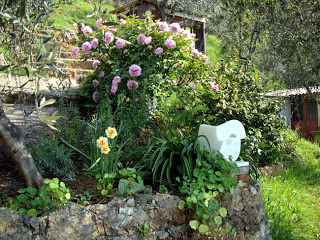
So, it's everything into the suitcase again and print outs of boarding passes and train timetables.... I've scheduled a couple of blogs for next week in my absence and will catch up with the world again on the 28th of April. Oh, and I mustn't forget to pack a hot water bottle.
 The retreat is being run by Dr Sharon Blackie, editor of Earthlines Magazine and
Two Ravens Press
and
Roselle Angwin
, and it's called
'Singing Over the Bones
- Women Writing from the Wild'. I don't really know what to expect from it. One part of me is very excited at the idea of being cut off from computers and telephones and other modern gadgetry for a week with nothing to do but write; the other is rather afraid that nothing will happen at all - that I'll arrive so exhausted I'll spend the week sleeping rather than thinking and writing. Will I find my own inner Wild Woman? And will I like the other wild women I'm sharing a house with?
The retreat is being run by Dr Sharon Blackie, editor of Earthlines Magazine and
Two Ravens Press
and
Roselle Angwin
, and it's called
'Singing Over the Bones
- Women Writing from the Wild'. I don't really know what to expect from it. One part of me is very excited at the idea of being cut off from computers and telephones and other modern gadgetry for a week with nothing to do but write; the other is rather afraid that nothing will happen at all - that I'll arrive so exhausted I'll spend the week sleeping rather than thinking and writing. Will I find my own inner Wild Woman? And will I like the other wild women I'm sharing a house with?
And how can I leave Italy, now that spring has arrived and the cherry tree is in full bloom and the sun is (at last) shining on my little patch of garden?

So, it's everything into the suitcase again and print outs of boarding passes and train timetables.... I've scheduled a couple of blogs for next week in my absence and will catch up with the world again on the 28th of April. Oh, and I mustn't forget to pack a hot water bottle.
Published on April 19, 2013 02:49
April 18, 2013
Best Indie Book Awards
There's just over a week to register for the Best Indie Book Awards, but the prizes are worth going for. This is the second year they've run it, but this year it's being judged by panels rather than the Kindle Book Reviewers themselves. A limited number of genres only, and you have to have published within the time frame they've set out (May to May1 2012-13).
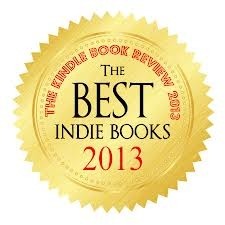
Just follow this link to the page for Registration, which costs $20.00

Just follow this link to the page for Registration, which costs $20.00
Published on April 18, 2013 02:58
April 14, 2013
Five Things I've Learned About E-Publishing
It's the London Book Fair this week and I'd love to have gone and supported other Indie authors on the ALLIA stand, authors such as my fellow Electric Author Roz Morris, but it couldn't be fitted in this year. However, I'm there in spirit and thought it might be useful to others thinking of E-publishing, if I shared some of the things I've learned in the last 3 years.
What have I learned about e-publishing?1. Not to be snobbish about indie publishingAs a traditionally published author, I’d been brought up to believe that any kind of self-publishing was vanity publishing. Then as a creative writing tutor, I watched some of my students putting very sub-standard work out through firms such as Author House, claiming it as genuine publication, and it horrified me. I was a very slow convert to Indie publishing and came into it initially just to put my back-list into print. This seemed a legitimate use of the POD and e-book capability - after all, those books had the gatekeepers’ seal of approval so there was no shame attached. What a lot I had to learn!
2. What fantastic things are on offer out there!That was the first thing I discovered as I began to explore the Indie-book jungle. Not only were there lots of exciting new writers, victims of the recession in publishing, but some of the best-selling writers were putting their back-lists out, and they were publishing new books too. I went to a London Writers’ Club event where an author publishing main-stream romantic novels with Random House gave a talk on her experience. In four years she had gone from having big advances (around £80,000) offered for her books, to a miserly £10,000. There had been complaints that her books weren’t selling as well as expected. She complained that they weren’t making much of an effort to sell them. So she decided to do it herself using Lulu and Amazon. She’d sold almost £8,000 worth of books in the first two months with very little effort. Her experience with her publishers was fairly common among the writers in the room. We’d all seen reduced advances, books that were still selling taken out of print, been victims of conscious decisions not to promote our work. It was soul-destroying.
3. That it’s the only way to go nowWhen I sent my last manuscript to my agent - a lovely person and very over-worked - she simply didn’t have the time to read it. The reader’s report she commissioned was glowing, but my agent warned me that it was not ‘in genre’ enough to fit marketing slots. The process of submission and response took months and months and months. In the end we agreed that I would publish it myself. The current system of agent submission (always supposing you have one), reader’s report, (often around 5 or 6 months) followed by approach to publishers (who can take more than 6 months to respond), simply can’t be justified with today’s technology. Even if your book is accepted it will be at least another year before it hits the bookshops. With e-publication and POD I can have a book edited, proof-read and on sale within 3 months of finishing the manuscript - just like it used to be in the old days. And most of the money it earns is mine.
4. That it’s not enough to write - you have to learn how to be a publisherThat’s been a big learning curve. Once upon a time I would have been rung up by an enthusiastic young girl with a media degree working as an intern, and she’d send me a questionnaire, followed a few weeks later by a list of talks, bookshop events and literature festivals. Not any more. Now I have to do my own editing, proof-reading, publicity and arrange my own author events. And it is hard! Most literature festivals aren’t even looking at Indie authors, even if they have a long track-record with traditional publishers.
5. The importance of friends rather than competitors.I found the traditional literature scene very competitive and, though I have met some kindred spirits, I’ve also witnessed, or been the victim of, petty rivalries and jealousies, often conducted in the press under the cover of honest reviews. In the indie world I’ve discovered a friendly, supportive group of people, all anxious to help each other navigate the maze. We’re sharing information, rather than guarding it, with the kind of generosity I’ve rarely seen in the marketplace. This is completely new and probably the best thing I’ve learned from the two years I’ve been in Indie publishing - the importance of cooperation, not competition.
www.kathleenjones.co.uk
What have I learned about e-publishing?1. Not to be snobbish about indie publishingAs a traditionally published author, I’d been brought up to believe that any kind of self-publishing was vanity publishing. Then as a creative writing tutor, I watched some of my students putting very sub-standard work out through firms such as Author House, claiming it as genuine publication, and it horrified me. I was a very slow convert to Indie publishing and came into it initially just to put my back-list into print. This seemed a legitimate use of the POD and e-book capability - after all, those books had the gatekeepers’ seal of approval so there was no shame attached. What a lot I had to learn!
2. What fantastic things are on offer out there!That was the first thing I discovered as I began to explore the Indie-book jungle. Not only were there lots of exciting new writers, victims of the recession in publishing, but some of the best-selling writers were putting their back-lists out, and they were publishing new books too. I went to a London Writers’ Club event where an author publishing main-stream romantic novels with Random House gave a talk on her experience. In four years she had gone from having big advances (around £80,000) offered for her books, to a miserly £10,000. There had been complaints that her books weren’t selling as well as expected. She complained that they weren’t making much of an effort to sell them. So she decided to do it herself using Lulu and Amazon. She’d sold almost £8,000 worth of books in the first two months with very little effort. Her experience with her publishers was fairly common among the writers in the room. We’d all seen reduced advances, books that were still selling taken out of print, been victims of conscious decisions not to promote our work. It was soul-destroying.
3. That it’s the only way to go nowWhen I sent my last manuscript to my agent - a lovely person and very over-worked - she simply didn’t have the time to read it. The reader’s report she commissioned was glowing, but my agent warned me that it was not ‘in genre’ enough to fit marketing slots. The process of submission and response took months and months and months. In the end we agreed that I would publish it myself. The current system of agent submission (always supposing you have one), reader’s report, (often around 5 or 6 months) followed by approach to publishers (who can take more than 6 months to respond), simply can’t be justified with today’s technology. Even if your book is accepted it will be at least another year before it hits the bookshops. With e-publication and POD I can have a book edited, proof-read and on sale within 3 months of finishing the manuscript - just like it used to be in the old days. And most of the money it earns is mine.
4. That it’s not enough to write - you have to learn how to be a publisherThat’s been a big learning curve. Once upon a time I would have been rung up by an enthusiastic young girl with a media degree working as an intern, and she’d send me a questionnaire, followed a few weeks later by a list of talks, bookshop events and literature festivals. Not any more. Now I have to do my own editing, proof-reading, publicity and arrange my own author events. And it is hard! Most literature festivals aren’t even looking at Indie authors, even if they have a long track-record with traditional publishers.
5. The importance of friends rather than competitors.I found the traditional literature scene very competitive and, though I have met some kindred spirits, I’ve also witnessed, or been the victim of, petty rivalries and jealousies, often conducted in the press under the cover of honest reviews. In the indie world I’ve discovered a friendly, supportive group of people, all anxious to help each other navigate the maze. We’re sharing information, rather than guarding it, with the kind of generosity I’ve rarely seen in the marketplace. This is completely new and probably the best thing I’ve learned from the two years I’ve been in Indie publishing - the importance of cooperation, not competition.
www.kathleenjones.co.uk
Published on April 14, 2013 15:30
April 12, 2013
Embedded in Biography
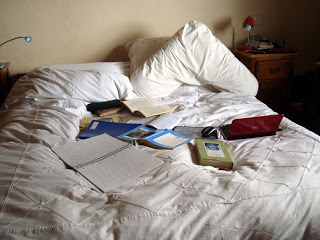
Welcome to the private view of my very own Tracey Emin! In England I have a lovely writing space up in the roof space, designed for me by Neil, but here in Italy I have to improvise.
It's not easy writing and researching a biography - you need a lot of space to spread out papers and books so that you can put your hand on a reference at a moment's notice, and - because you spend long hours poring over a book or the computer screen - it can be hard on your spine.
The solution for me here, has been to write in bed. They have huge beds in Italy - so wide are the 'Matrimoniale' that you are hard put to find the other person in the dark at all! Ours is more than six feet across. But it's ideal during the day. I can spread out my books and papers, prop myself up on pillows with the lap top in its proper place and work comfortably. At the moment I have about 7 books, four notebooks, and a file full of loose bits of paper strewn around the duvet. I have two word processing programmes open on the computer, with several tabs open so that I can flick to and fro through chapters and research notes. It's all chaos and at the moment only I (possibly not even I!) have the vaguest idea of how it all fits together.
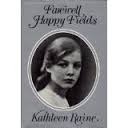
Currently I'm reading Kathleen Raine's various autobiographies and biographies and working through the poetry she and Norman Nicholson wrote while Kathleen was in the Lake District at the beginning of the war. And I can't help remembering how fascinated I was as a young writer with the story of her tragic relationship with Gavin Maxwell and his beloved otter Mij. Now I find her poem again 'He has married me with a ring, a ring of bright water/ Whose ripples travel from the heart of the sea' - Gavin's book, the Ring of Bright Water, was one of my favourite books, at that time, and I still feel the magic of her poem, also written at Gavin's croft on the Scottish coast, which I knew by heart when I was sixteen; 'Reaching down arm deep into bright water/I gathered on white sand under waves/Shells, drifted up on beaches where I alone/Inhabit a finite world of years and days'. So I've been straying a bit from the Nicholson pathway - one of the temptations of research, to get side-tracked. But the back lanes are so attractive!
Published on April 12, 2013 06:13



